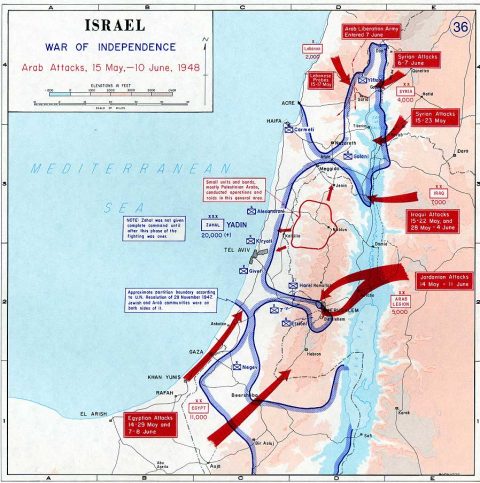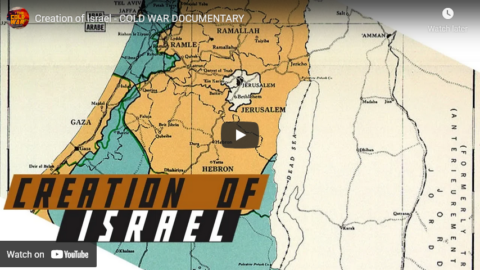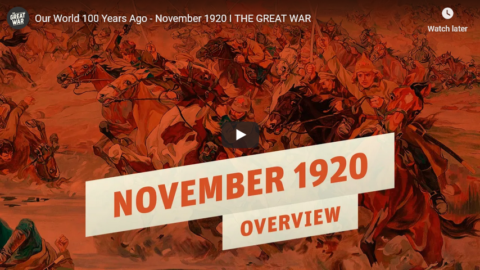Fiume was a port on the Adriatic coast with several thousand residents, almost half of whom were ethnic Italians that had been under Austro-Hungarian rule for several hundred years after it once having been a Venetian trade port. By some quirk, Fiume was missed in the Treaty of London, probably because it had never been envisioned by the Allies that the Austro-Hungarian Empire would ever truly disintegrate and the rump of it that would remain required a sea port in some form. The city’s other residents were ethnically Serbian and Croatian, who knew the city as Rijeka (as you will find it named on a map today). All of this complexity meant that the fate of Fiume became a major topic of controversy during the Versailles Peace Conference. President Woodrow Wilson had become so unsure of what to do that he proposed the place become a free city and the headquarters of the nascent League of Nations, under the jurisdiction of no country.
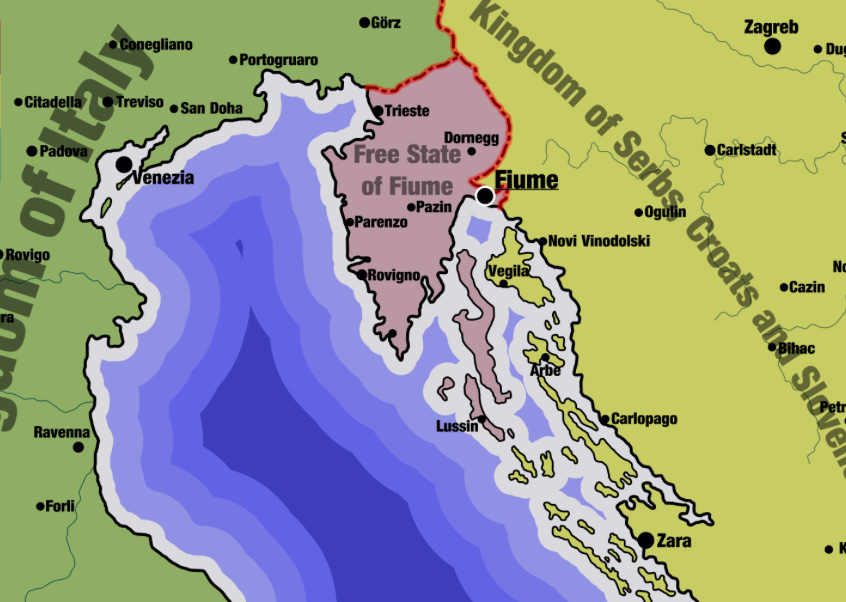
By September 1919 there was still no conclusion as to the fate of Fiume. Events had overtaken the place and through the Treaty of St Germain, the Austro-Hungarian Empire had been dissolved after the abdication of the final Habsburg Emperor Charles I. Once again, Fiume had not been mentioned in the treaty and the country it had been set aside for no longer existed. The city’s fate was still at play.
Enter Gabriele D’Annunzio, an aristocrat from Abruzzo on the eastern coast of Italy. Born in 1863, he was a handsome and intelligent child and was nurtured by his family to be exceptional, with a predictable side effect of immense selfishness. As a teenager, he had begun to dabble in poetry and it was praised by authors unaware of his age. At university he began to be associated with Italian irredentism, a philosophy that yearned for all ethnic Italians to live in one country – by retaking places under foreign rule like Corsica, Malta, Dalmatia and even Nice.
[…]
The Italian government’s lack of interest [in Fiume] was unacceptable to D’Annunzio and he made clear he would take action to prevent it becoming part of Yugoslavia by default. With his fame and pedigree he was able to quickly assemble a small private force of ex-soldiers, who he quickly took to calling his “legionaries”. In September 1919 after the Treaty of St Germain was signed, his small legion of a few hundred marched from near Venice to Fiume in what they called the Impresa – the Enterprise. By the time he had reached Fiume, the “army” numbered in the thousands, the vanguard crying “Fiume or Death” with D’Annunzio at its head in a red Fiat.
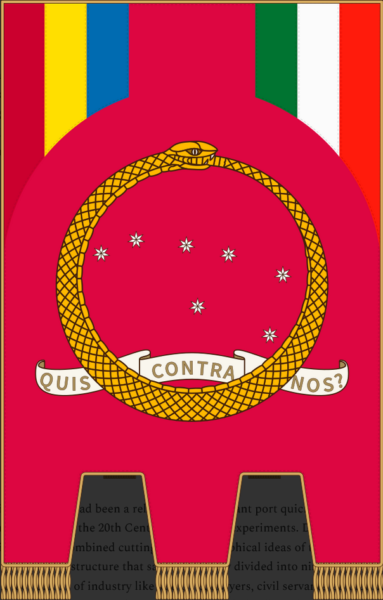
A flag designed by Gabriele D’Annunzio for the would-be independent state of Fiume, 1919.
The only thing that stood in his way was the garrison of the Entente, soldiers who had been given orders to prevent D’Annunzio’s invasion by any means necessary. But amongst the garrison’s leaders were many [Italian officers] sympathetic to D’Annunzio’s vision, some even artists themselves and before long most of the defenders had deserted to join the poet’s army. On the 12th September 1919, Gabriele D’Annunzio proclaimed that he had annexed Fiume to the Kingdom of Italy as the “Regency of Carnaro” – of which he was the Regent. The Italian government was thoroughly unimpressed and refused to recognise their newest purported land, demanding the plotters give up. Instead, D’Annunzio took matters into his own hands and set up a government and designed a flag (to the right).
The citizens of what had been a relatively unimportant port quickly found themselves in the midst of one of the 20th Century’s strangest experiments. D’Annunzio instituted a constitution that combined cutting-edge philosophical ideas of the time with a curious government structure that saw the country divided into nine corporations to represent key planks of industry like seafarers, lawyers, civil servants, and farmers. There was a 10th corporation that existed only symbolically and represented who D’Annunzio called the “Supermen” and was reserved largely for him and his fellow poets.
These corporations selected members for a state council, which was joined by “The Council of the Best” and made up of local councillors elected under universal suffrage. Together these institutions were instructed to carry out a radical agenda that sought an ideal society of industry and creativity. From all over the world, famous intellectuals and oddities migrated to Fiume. One of D’Annunzio’s closest advisers was the Italian pilot Guido Keller, who was named the new country’s first “Secretary of Action” – the first action he took was to institute nationwide yoga classes which he sometimes led in the nude and encouraged all to join. When not teaching yoga, Keller would often sleep in a tree in Fiume with his semi-tame pet eagle and at least one romantic partner.
If citizens weren’t interested in yoga, they could take up karate taught by the Japanese poet Harukichi Shimoi, who had translated Dante’s works into Japanese. Shimoi, who quickly became known to the government of Fiume as “Comrade Samurai” was a keen believer in Fiume’s vision and saw it as the closest the modern world had come to putting into practice the old Japanese art of Bushido.
The whole thing would have felt like a fever dream to an outsider. If a tourist was to visit the city, they would have found foreign spies from across the world checking into hotels and rubbing shoulders with members of the Irish republican movement while others did copious amounts of cocaine, another national pastime in Fiume. The most fashionable residents of Fiume carried little gold containers of the powder, and D’Annunzio himself was said to have a voracious habit for it. Sex was everywhere one turned and the city had seen a huge inward migration of prostitutes and pimps within days of D’Annunzio’s arrival. Almost every day was a festival, and it was an odd evening if the harbour of Fiume did not see dozens of fireworks burst above it, watched on by D’Annunzio’s uniformed paramilitaries.
D’Annunzio himself lived in a palace overlooking the city, Osbert Sitwell describes walking up a steep hill to a Renaissance-style square palazzo which inside was filled with plaster flowerpots the poet had installed and planted with palms and cacti. D’Annunzio would cloister himself in his rooms for 18 hours a day and without food. Immaculate guards hid amongst the shrubs to ensure he would not be disturbed. In D’Annunzio’s study, facing the sea, he sat with statutes of saints and with French windows onto the state balcony. When he wanted to interact with his people he would wait for a crowd to form over some issue, walk to the balcony and then ask what they wanted.



